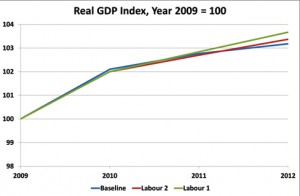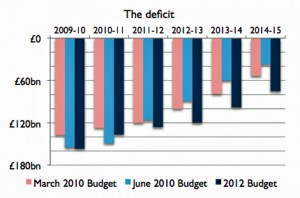The present dire state of the UK economy has led many to argue that Ed Balls’ repeated warnings, originally delivered in his Bloomberg speech in August 2010, that the Coalition Government is cutting ‘too far, too fast, have been justified. As we’ve seen, however, the reality is somewhat different: public spending in real terms does not even start to reduce until next year (2012-13), and even then it shrinks by just 1% of GDP.
It is true, though, that Labour’s publicly declared plans for the deficit at the 2010 general election were more modest in scope than those adopted by the Coalition. It is quite another question whether they would have stuck to them: after all, it was Labour’s Alistair Darling who warned of ‘cuts deeper than Thatcher’, and Liam Byrne who admitted there was no money left. But let us assume Labour would have done what they said they would: what then would have been the result for the British economy?

(Graph from Centre for Policy Studies; data from Ernst&Young ITEM club.)
This is a counter-factual question which has been assessed by the Ernst&Young ITEM team using a model identical to the Treasury’s to work out the macroeconomic impact of sticking to Labour’s fiscal plans between 2010 and 2012.
The results? Well, under the most likely scenario of Labour’s looser fiscal policy (identified in the graph below as Labour 2), economic growth would have been fractionally lower (2.0%) than under the Coalition (2.1%) in 2010, identical in 2011 (0.7%) and slightly higher in 2012 (0.7% cf 0.4%):
Overall, the marginally higher growth of Labour’s looser fiscal policy would have resulted in 70,000 fewer unemployed. However, that reduction would have been obtained with an increase in debt across the three years of £26 billion — the equivalent of £370,000 per job — to be repaid by the nation later.
In any case, Labour’s ‘too far, too fast’ mantra is built on sand. The reality is the Coalition has so slowed down its original deficit reduction programme that it is now less stringent than Alistair Darling’s. Yes, that’s right — the Coalition’s fiscal plans under David Cameron are looser than Labour’s fiscal plans were under Gordon Brown:

